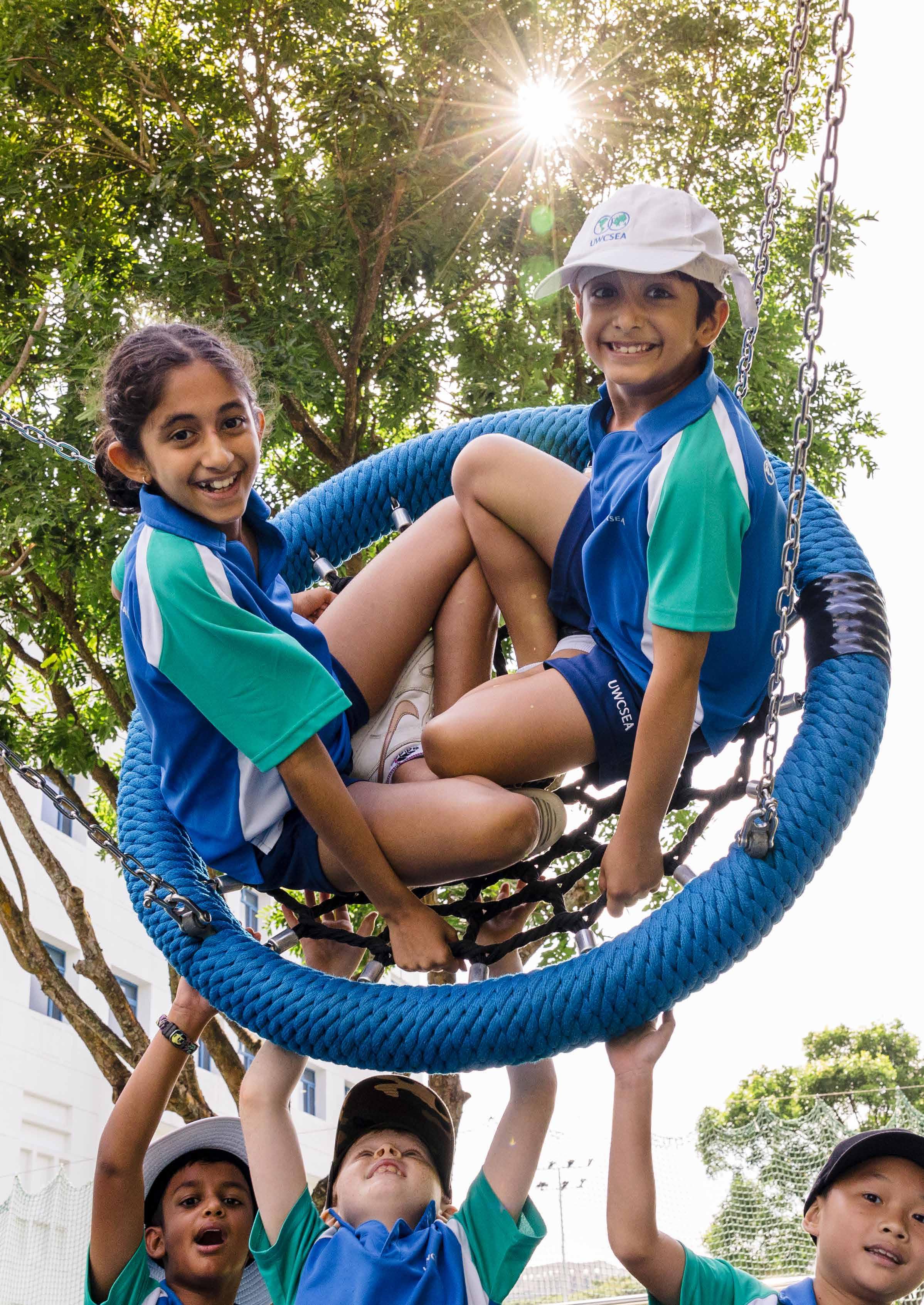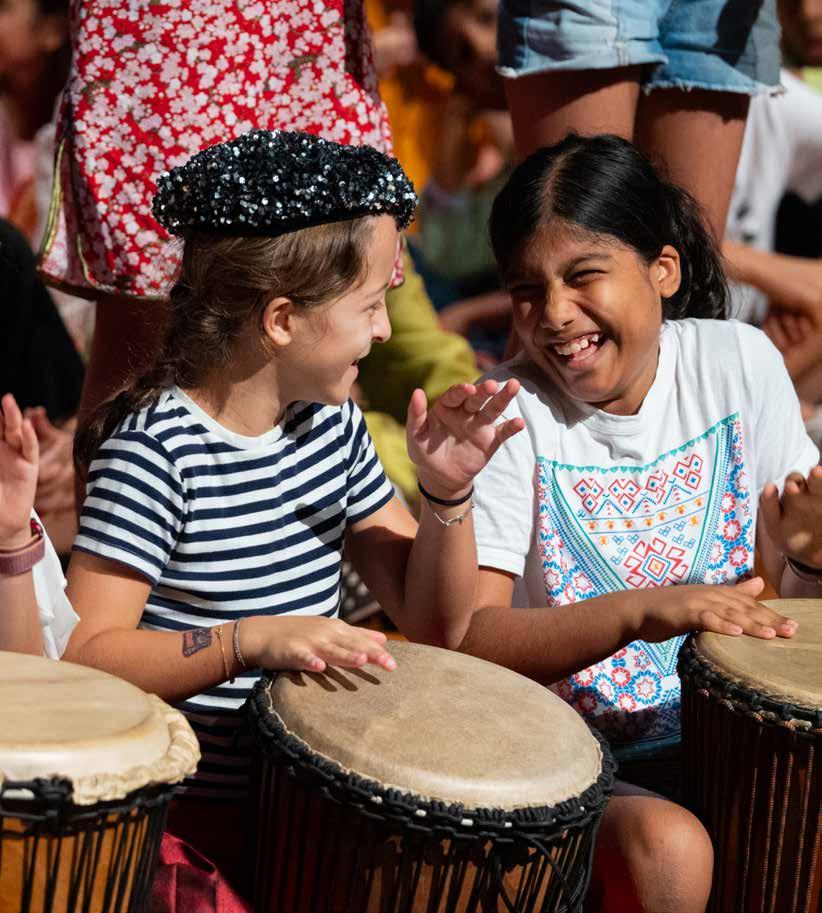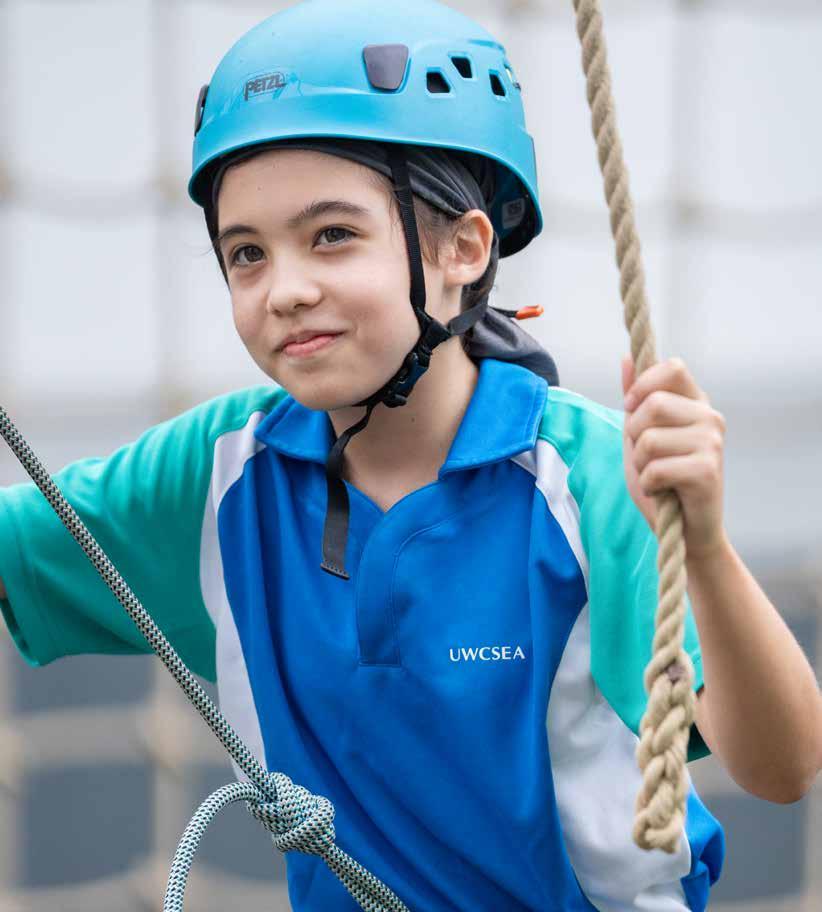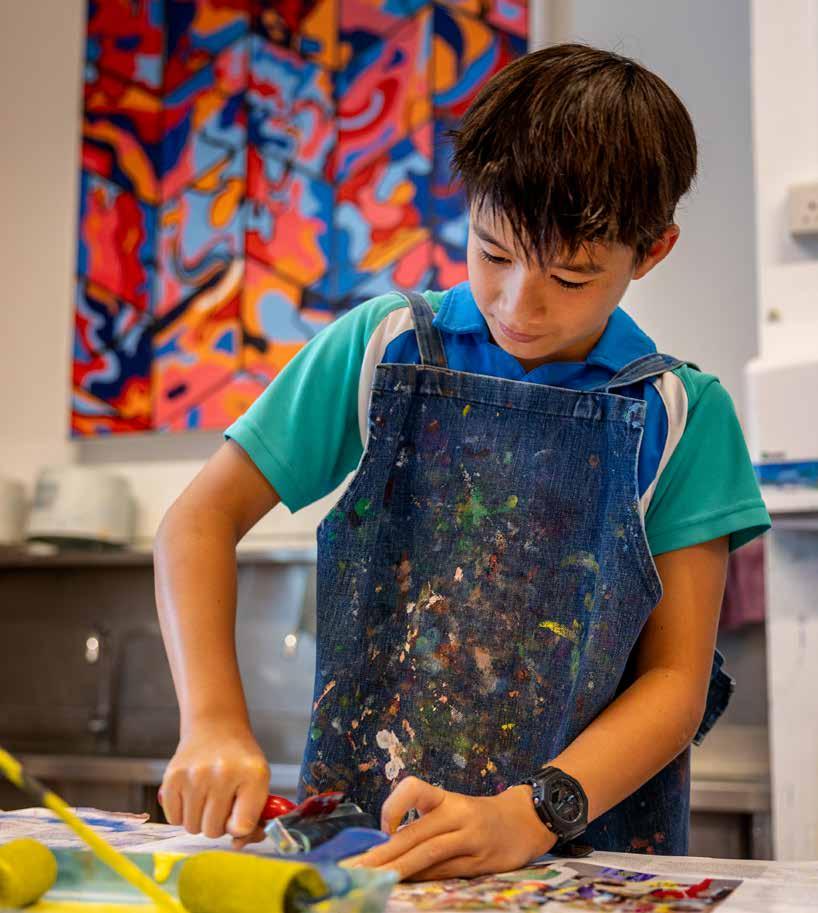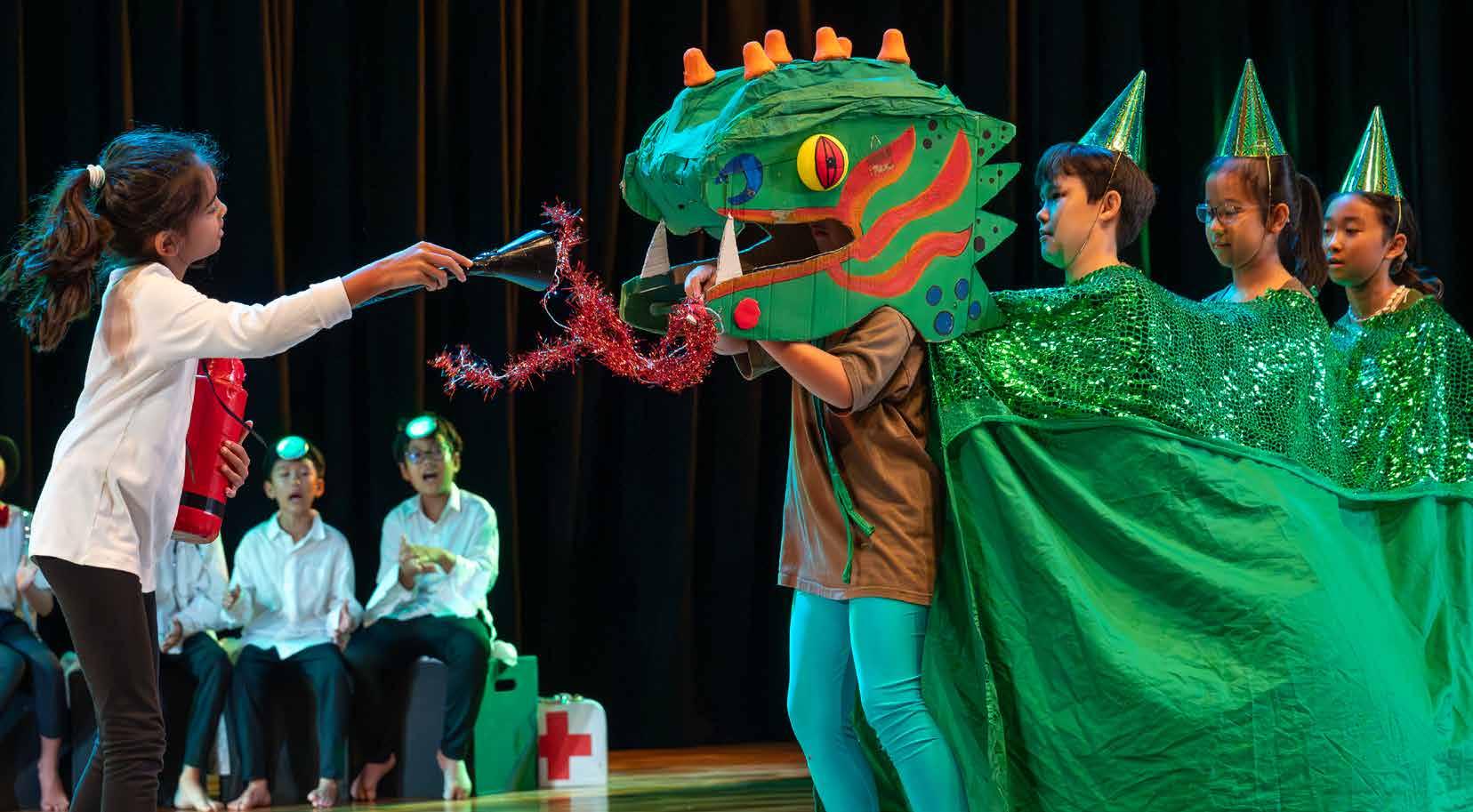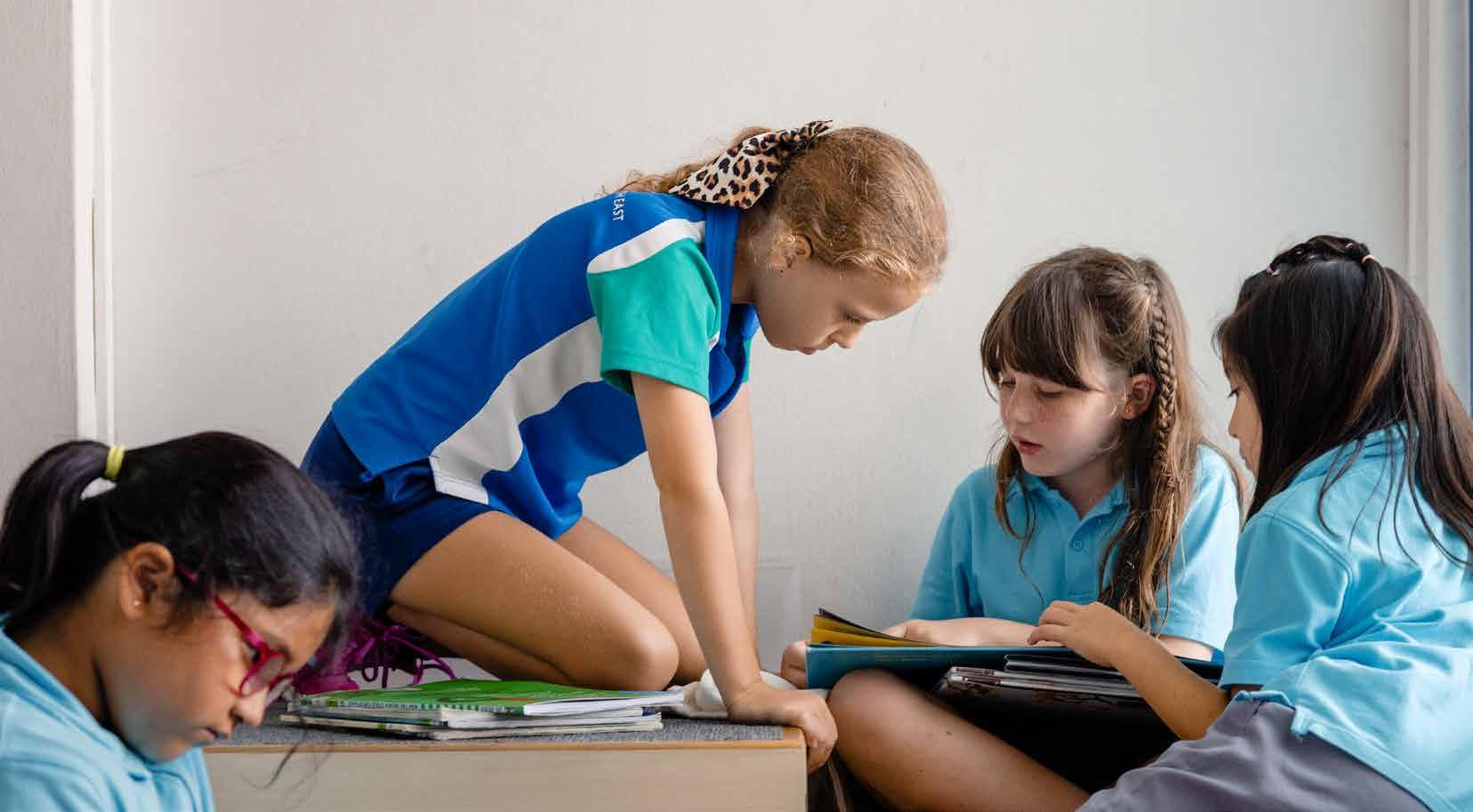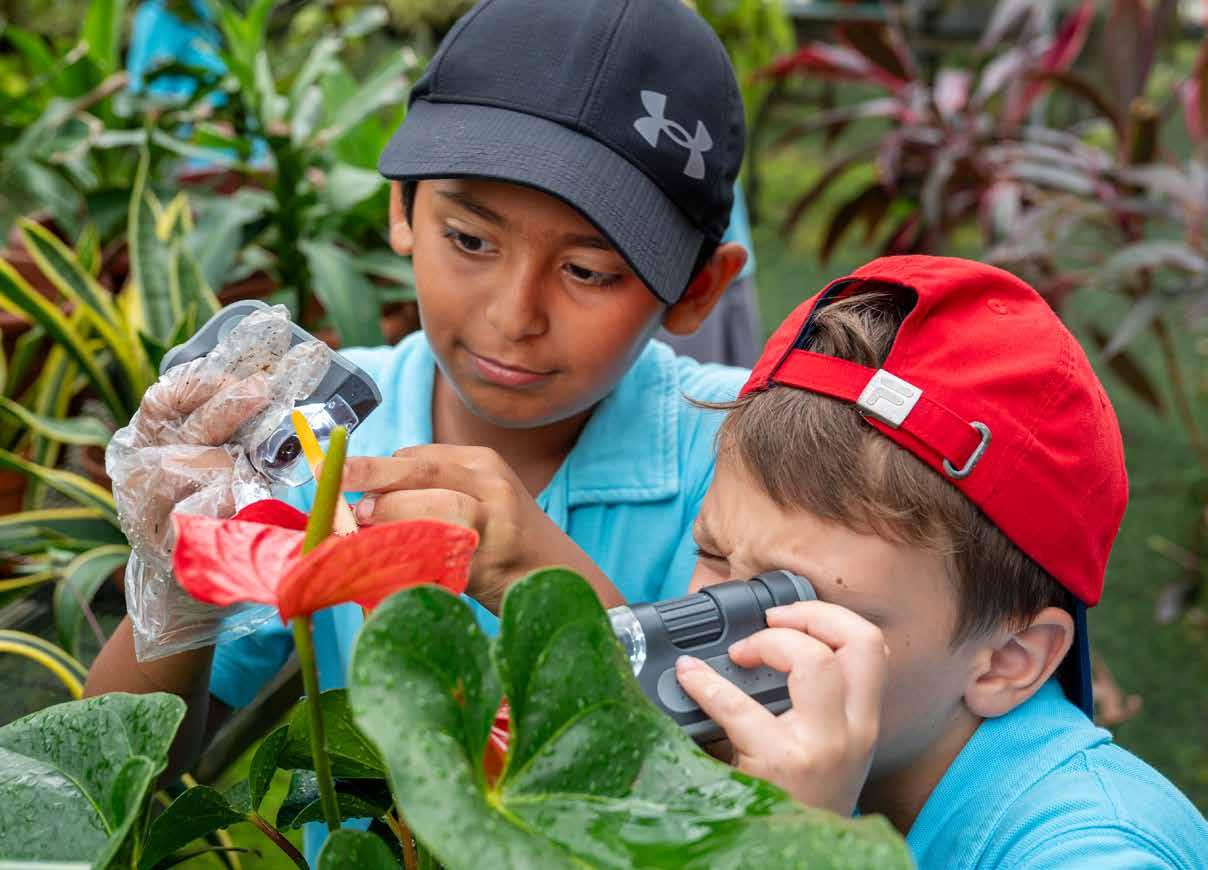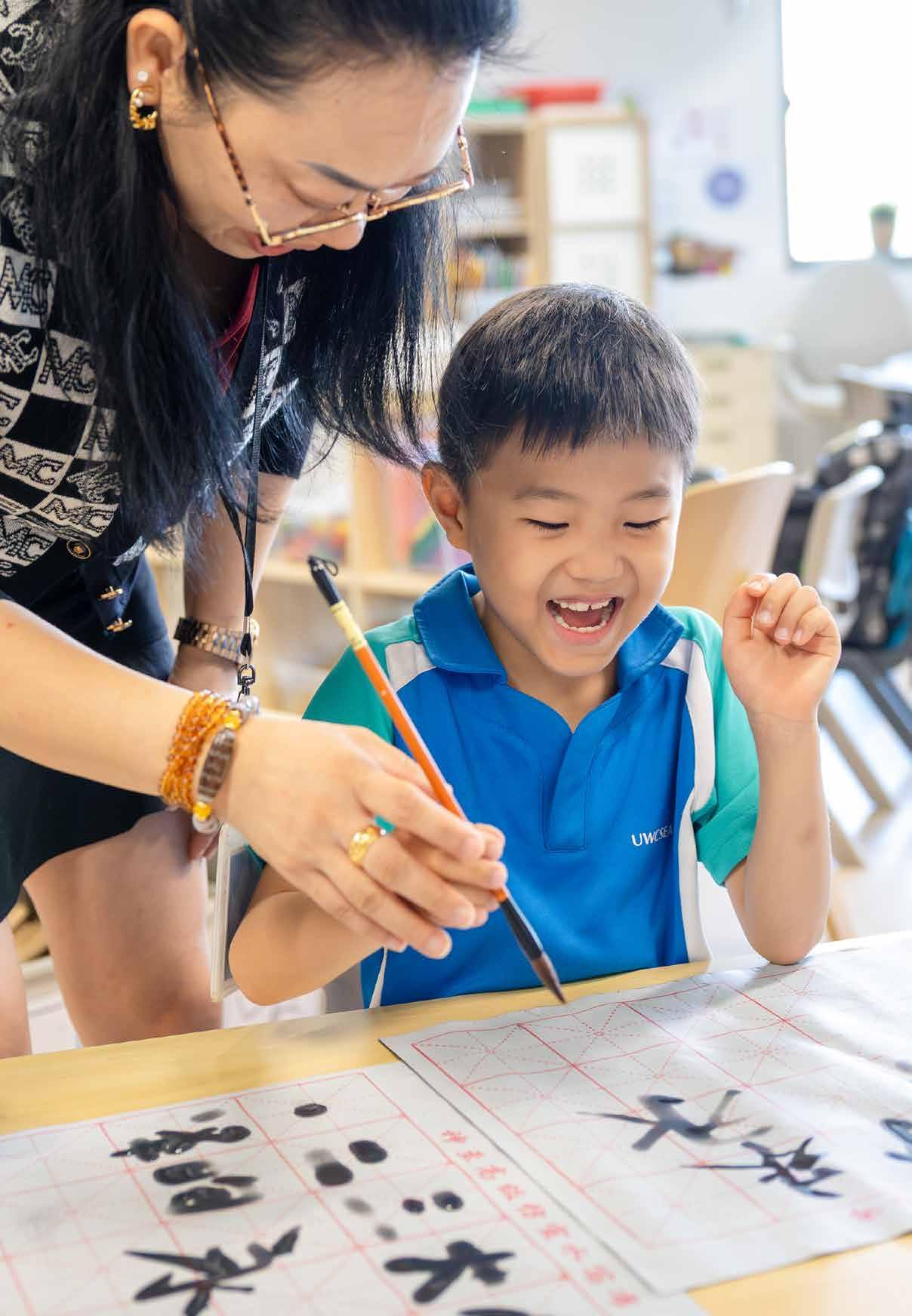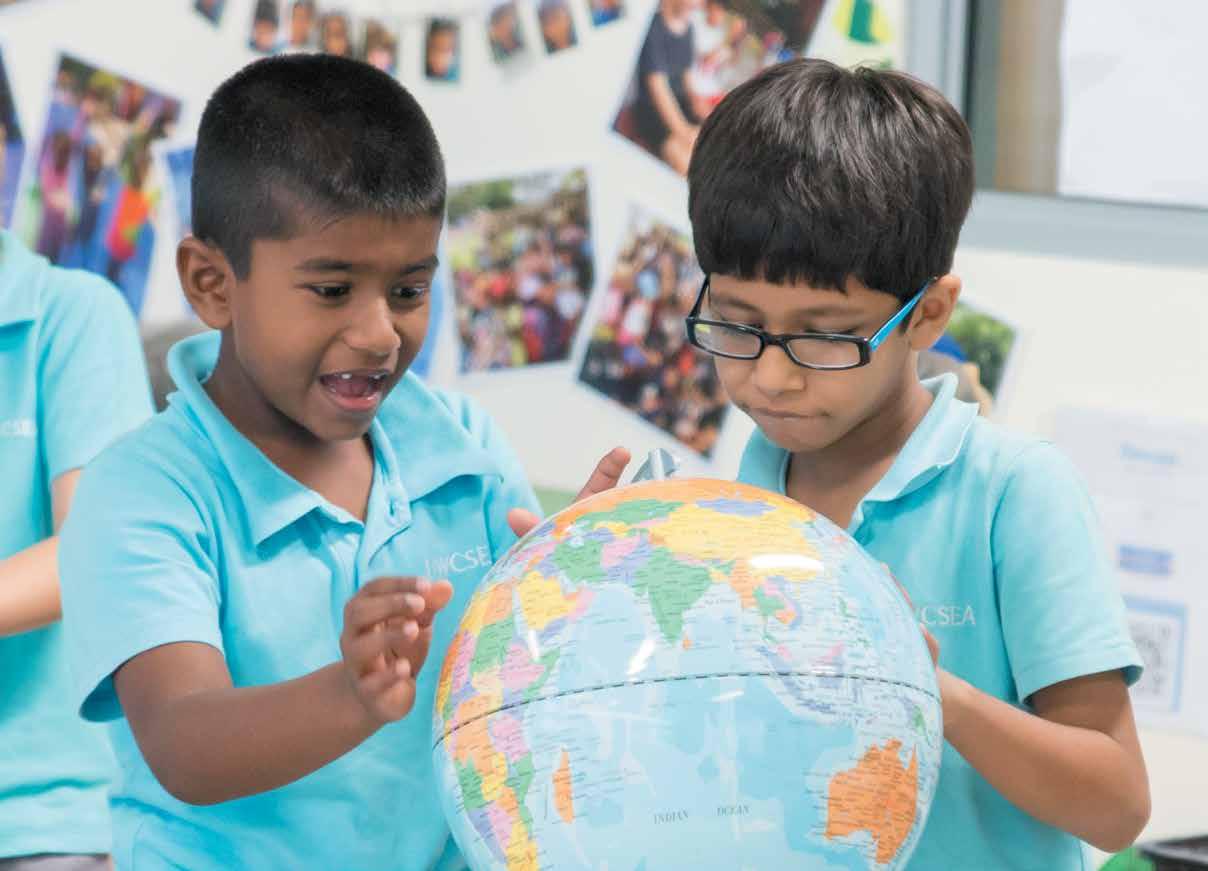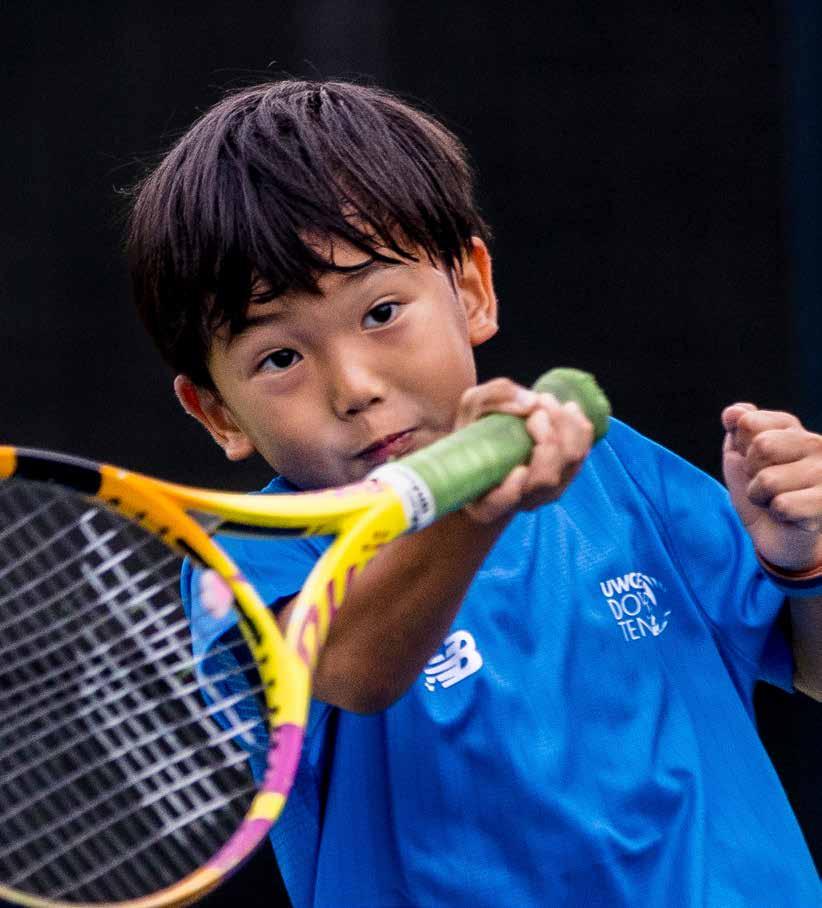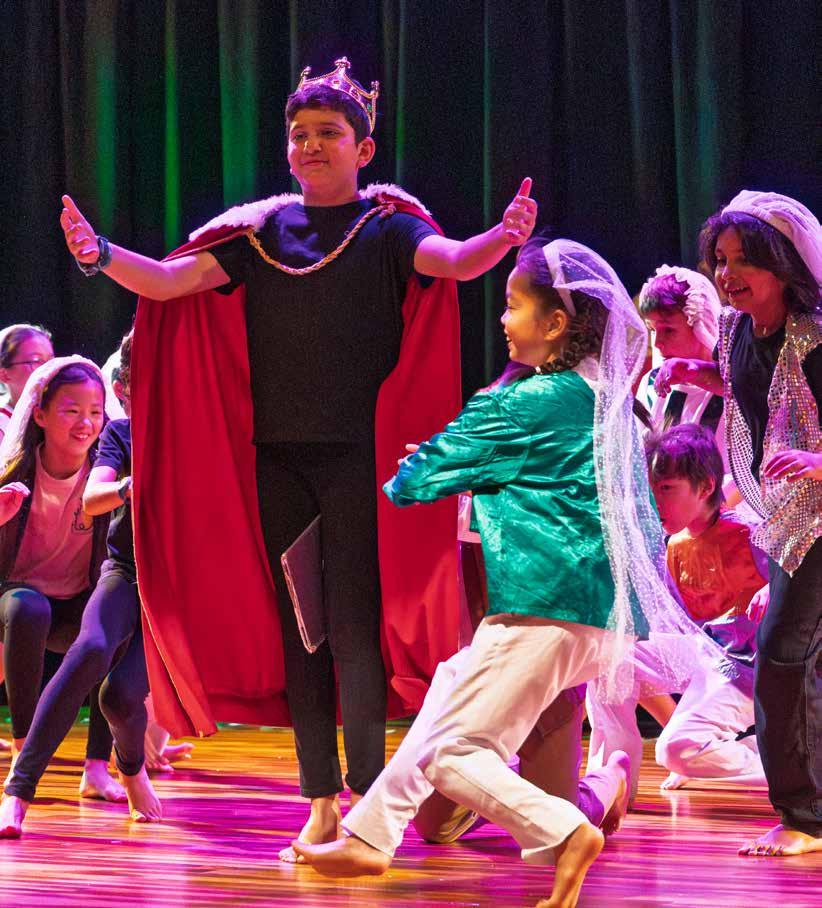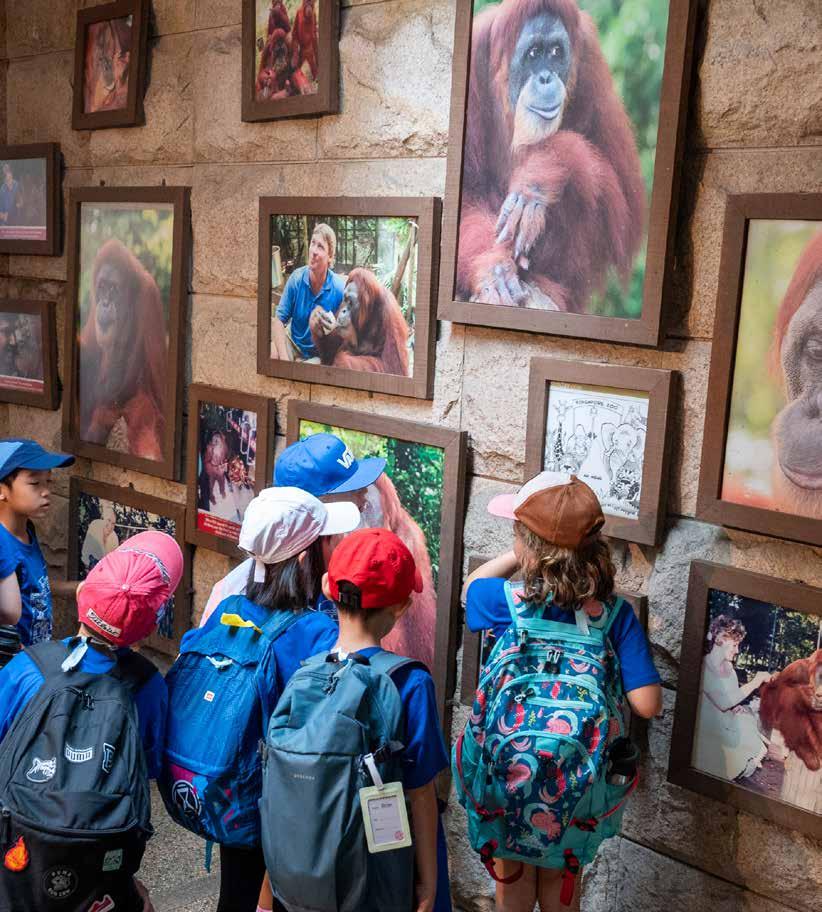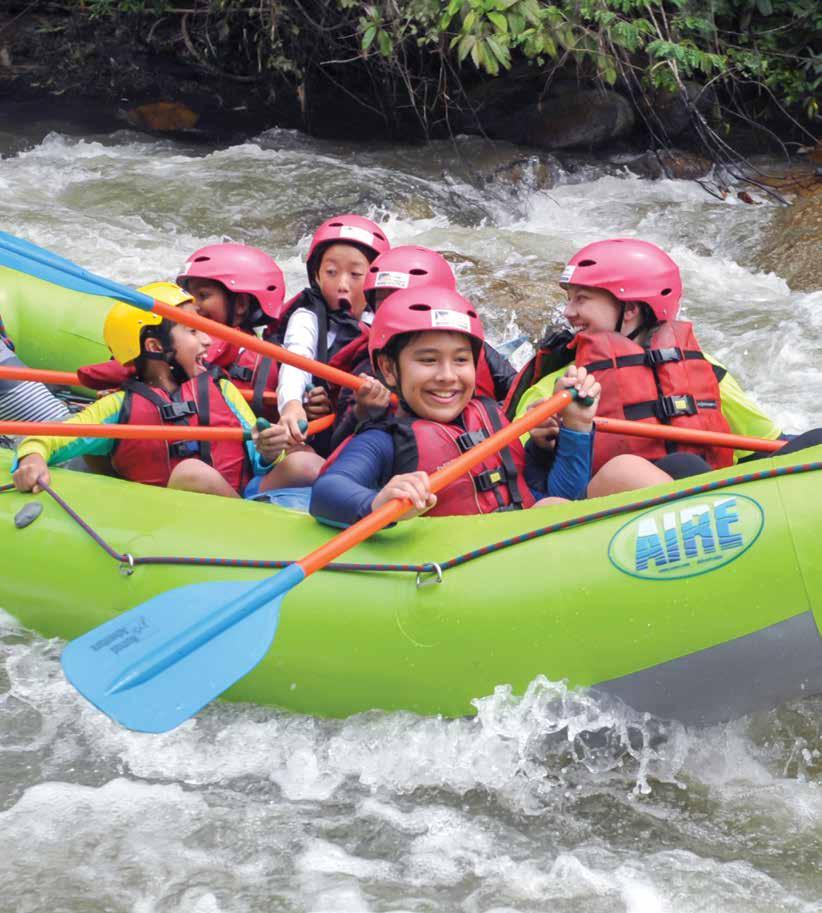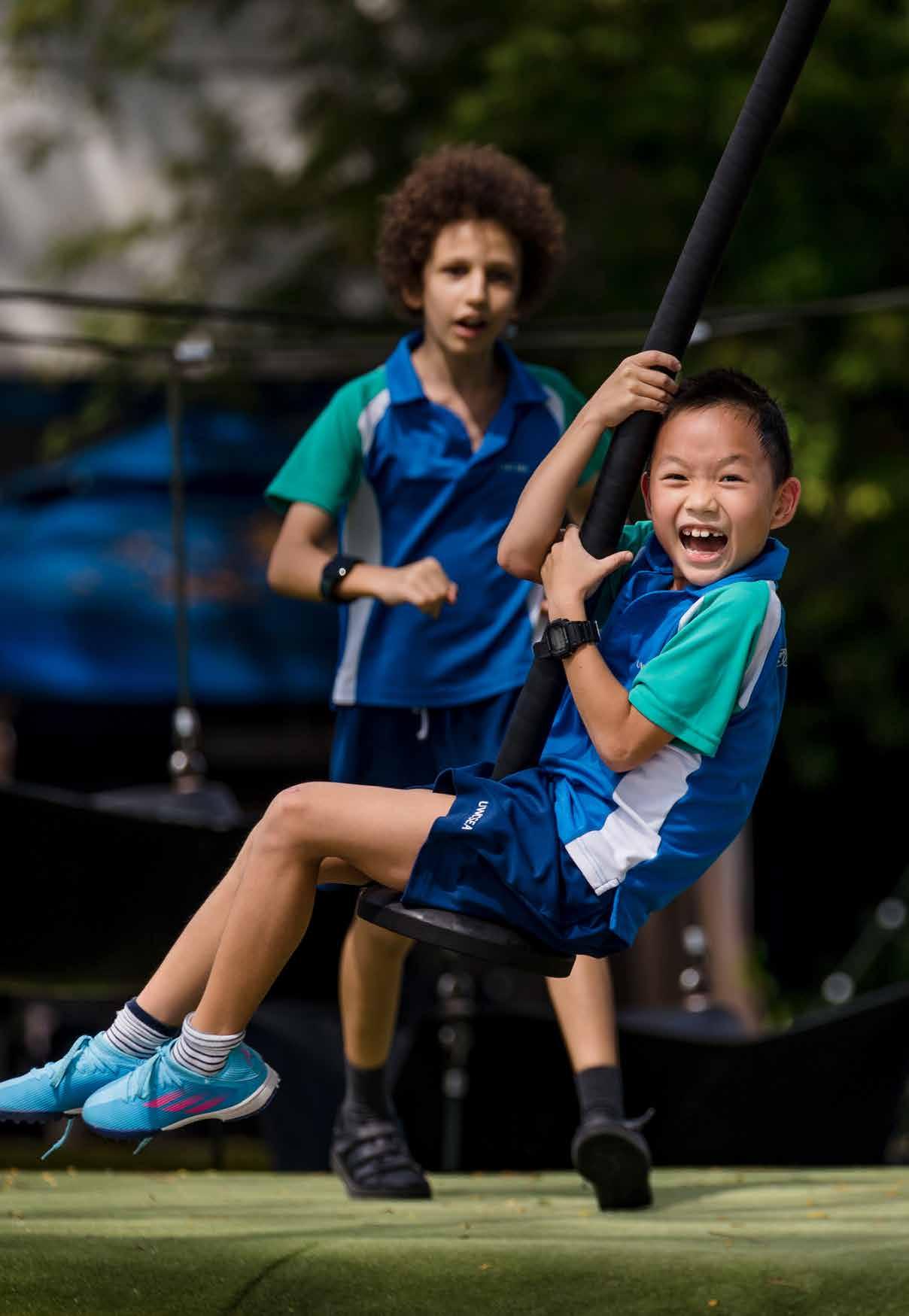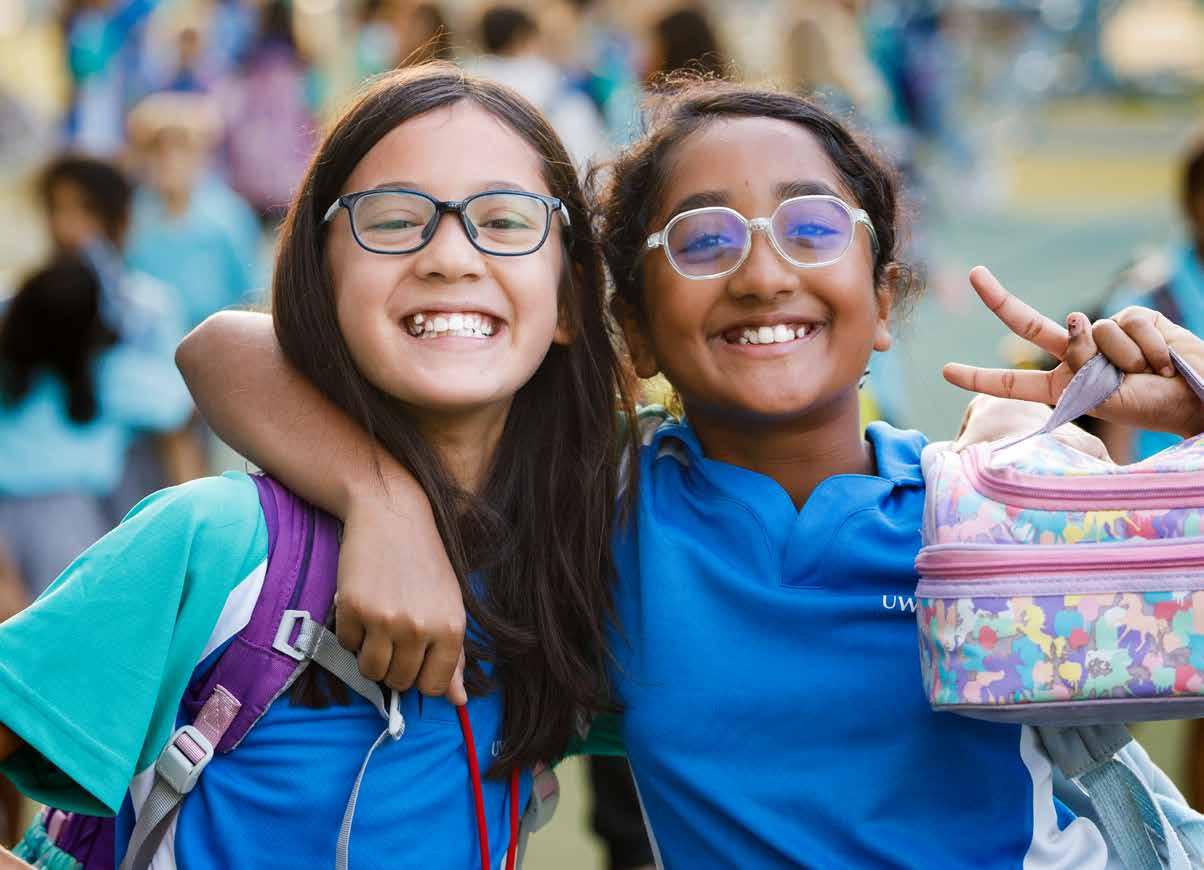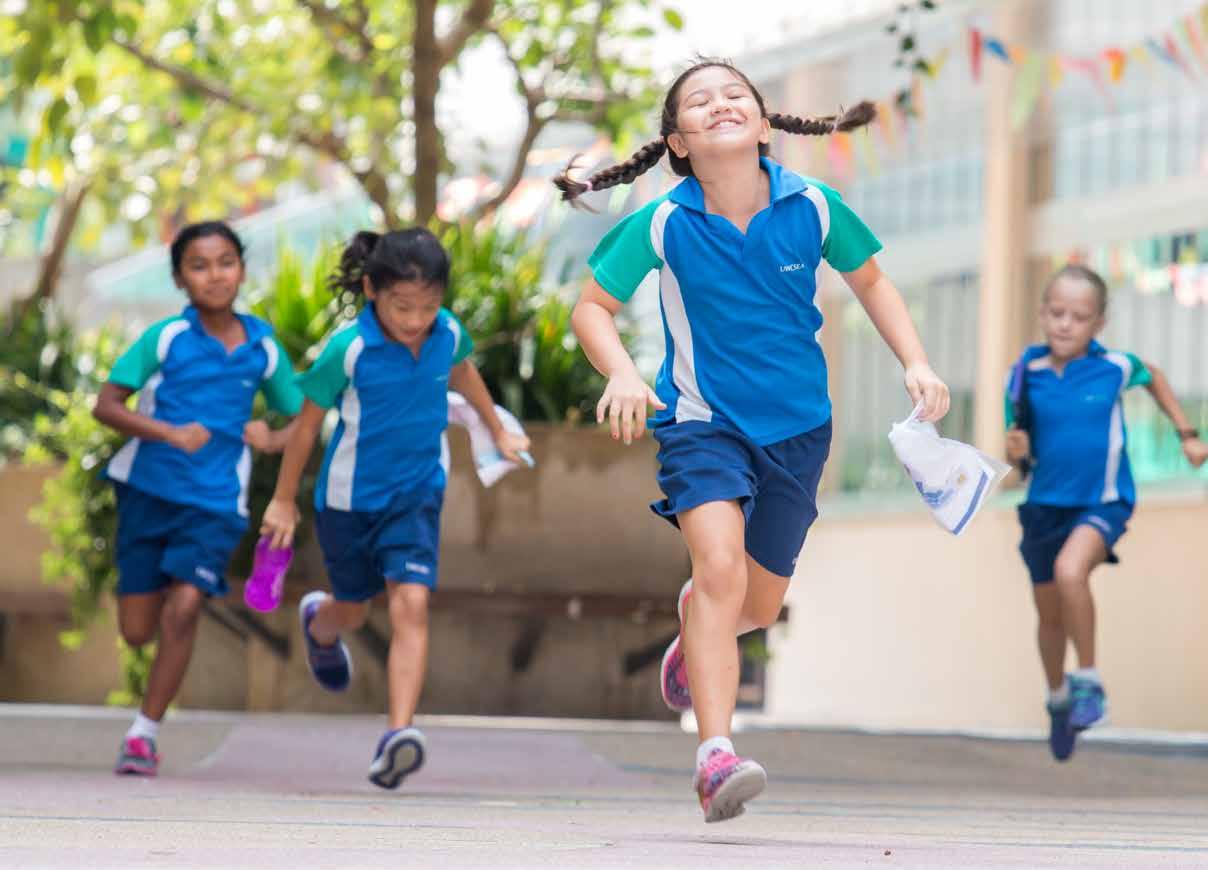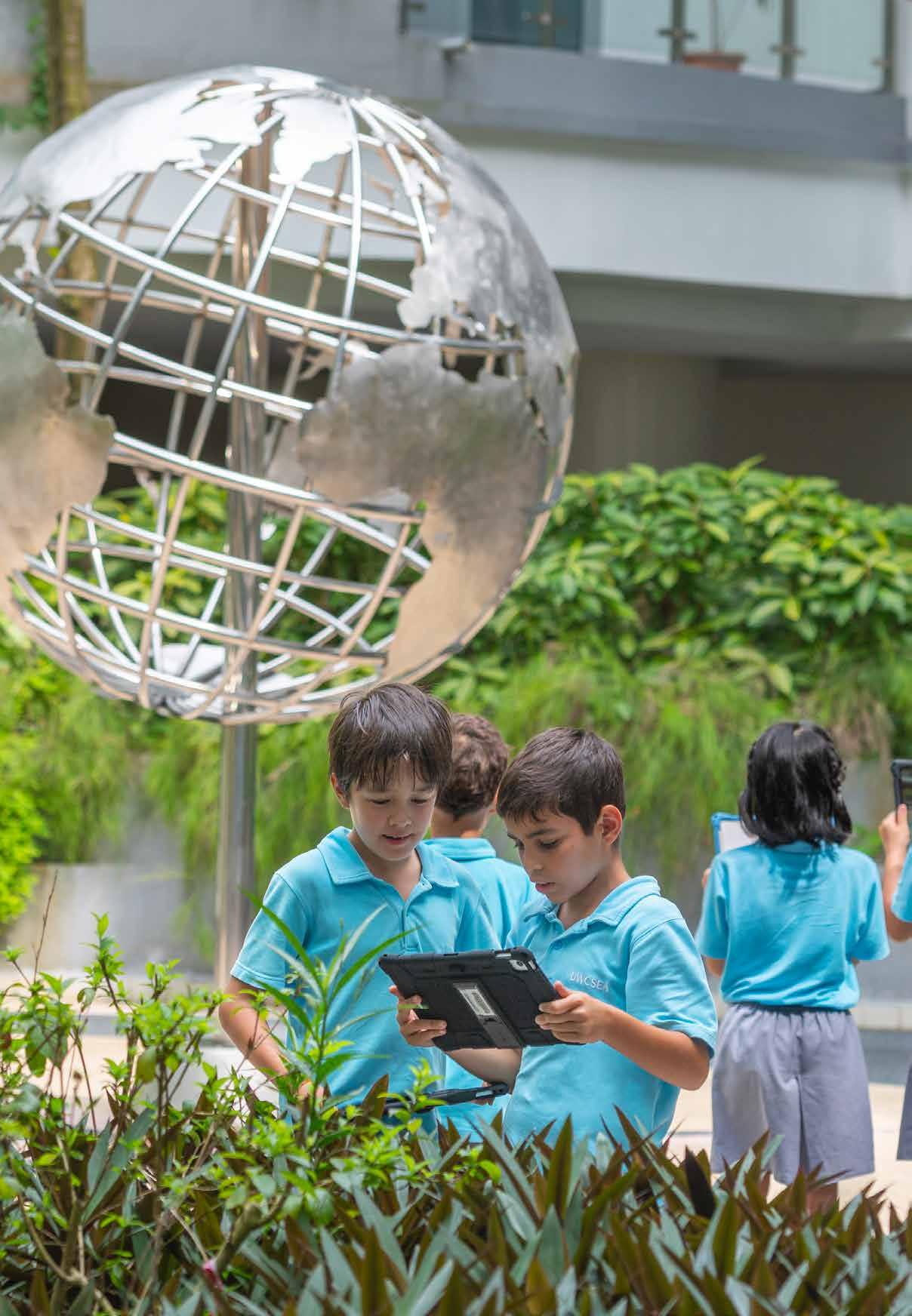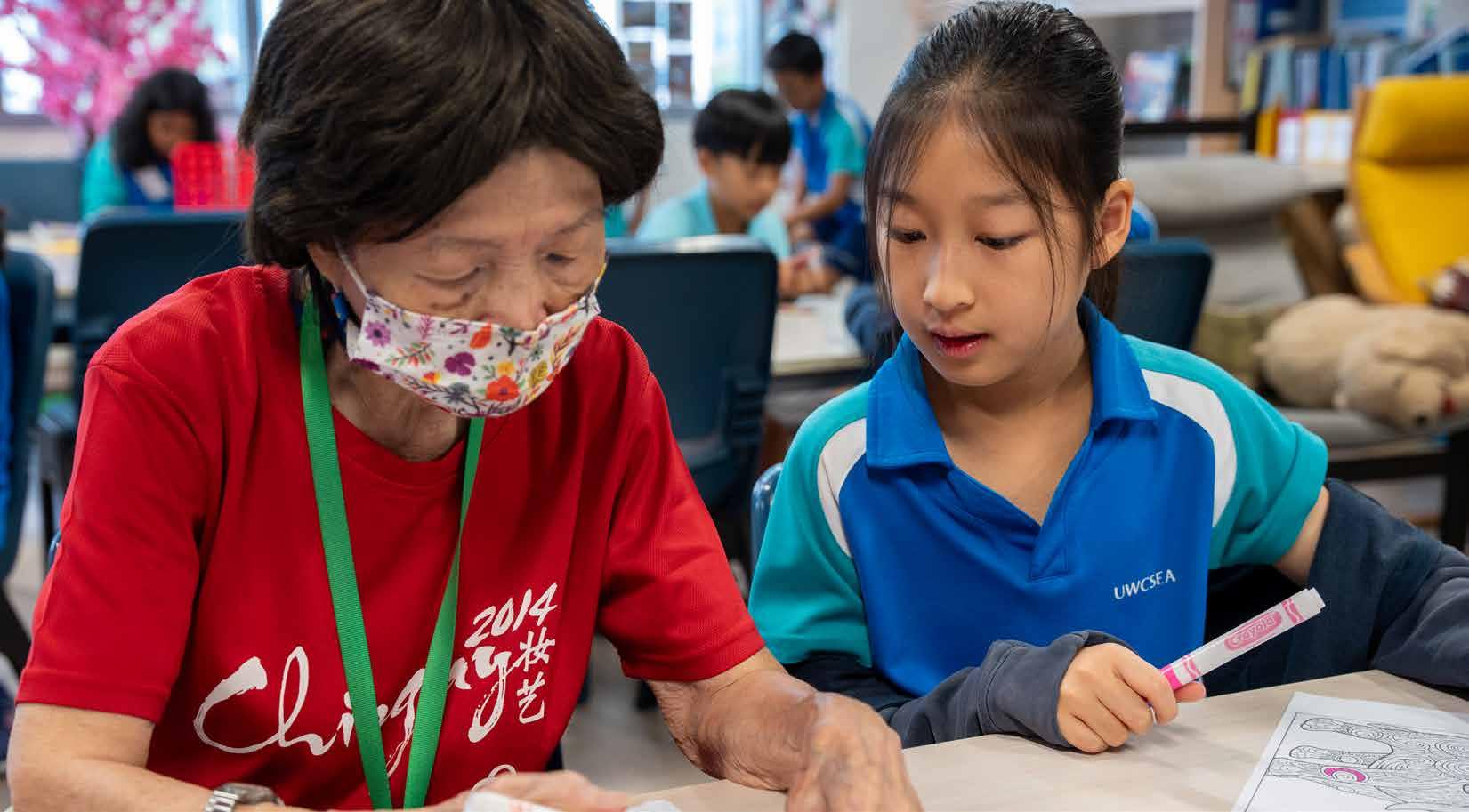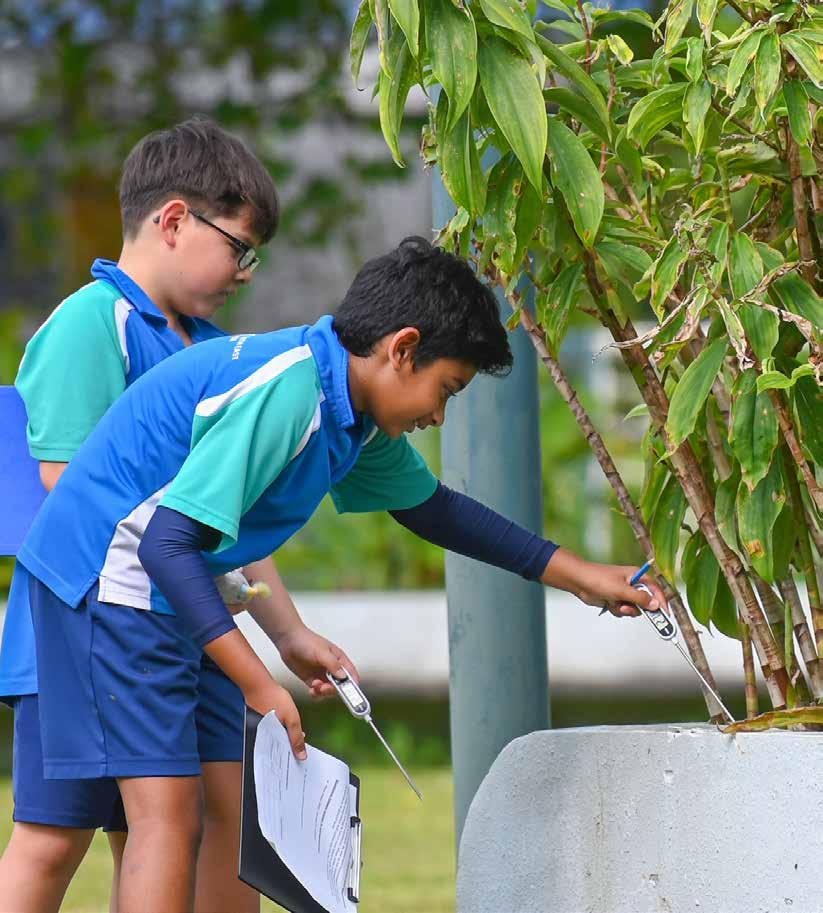Our Learning Programme
At UWCSEA, our holistic Learning Programme offers students a rich range of opportunities to grow and thrive. Across both Dover and East Campuses, the programme is built around five key elements: Academics, Activities, Outdoor Education, Personal and Social Education (PSE), and Service. Each element is equally valued, recognising that a balanced and comprehensive education is fundamental to achieving our educational goal and developing mission competency.
We are dedicated to providing a curriculum that is both challenging and age-appropriate. Carefully structured and grounded in research-informed practice, our written curriculum ensures that your child’s learning experience is meaningful and aligned with our mission, regardless of their age or educational background when they join the College.
Our curriculum is organised around six domains, closely aligned with broad academic disciplines:
In the early years, learning is play-based and interdisciplinary. For example, in a dramatic play area, students might set up a restaurant—creating menus, organising food, writing bills for customers, and practising social interactions. Through these playful experiences, students engage naturally with the arts (drama), literacy, mathematics, and personal and social education.
The design of the curriculum is informed by the UWCSEA mission statement, educational goal, values, and the needs of our students. Our concept-based curriculum organises learning around concepts and conceptual understandings, rather than just topics or facts. Learning goals are clearly articulated through three lenses:
• Conceptual Understandings (what students should understand),
• Knowledge (what students should know), and
• Skills (what students should be able to do).
This approach helps students build deep, transferable understanding, preparing them not only for academic success but for the complexities of life beyond the classroom.
Sciences and Technology
Arts and Design
UWCSEA Curriculum Domains
Humanities
Mathematics
Languages
Wellbeing
Academics
Our academic programme is structured around a holistic, inquiry-based approach to learning, guided by the UWCSEA profile and learning principles. In the Junior School, the academic curriculum is fully integrated with a Personal and Social Education (PSE) programme that supports students as they explore key topics such as friendships, family, personal identity, and selfawareness.
A student’s main point of contact throughout the school day is their classroom teacher, supported by a Teaching Assistant (TA).
• In Grades 2 and 3, each class has a dedicated TA.
• In Grades 4 and 5, one TA supports two classroom communities.
• Specialist TAs also work across grade levels to support individual students and enhance learning across the Junior School.
In addition to their core classroom experiences, students benefit from lessons taught by specialist teachers in:
• Physical Education
• Music
• Art
• Languages
Our specialist Maths, Literacy, and Digital Literacy coaches work alongside classroom teachers to embed best practices and support the effective integration of technology into everyday learning.
The school week is divided into approximately 40 periods. While the exact number of periods per subject may vary according to grade-level needs and timetabling, each period averages just under 40 minutes in length.
Literacy
Our overarching literacy goal is for students to become independent lifelong readers and writers, who communicate effectively through reading, writing, listening, speaking and presenting. To help students achieve this goal, we use a workshop approach, which provides a clear structure for students to gain skills and develop confidence. We also recognise literacy is not isolated to one specific area of study and is interdisciplinary by nature. Literacy occurs all day, every day, living within all traditional subject areas and so where appropriate, is integrated into other areas of the curriculum to make for more powerful learning connections. A wide range of literacy resources are available, to both students and teachers, to support the Literacy curriculum. In addition to the extensive collection in the Dover and East libraries, each class has a wide variety of genres in the classroom library for individualised reading.
Mathematics
The Primary School Mathematics curriculum has been developed to ensure students receive a thorough conceptual grounding in basic mathematical skills and processes with the aim of producing mathematicians who can use these skills in context in order to solve problems. Through imaginative, differentiated and practical activities, students enjoy the learning and recognise the application of mathematical concepts to everyday life.
We believe that students must be able to think critically about complex issues; analyze and adapt to new situations; solve problems of various kinds; and communicate their thinking effectively. Mathematics at all levels includes discussions; manipulation of concrete materials; investigations; problem solving; practice and consolidation, and mental maths.
Science and Humanities (Interdisciplinary Units of Study)
Interdisciplinary Units of Study allow students to explore concepts by drawing together elements of different subject areas into a meaningful whole. While focused largely on Science and/or Humanities, units can also incorporate aspects of the Literacy, Mathematics, Digital Literacy, Art, Music, and Languages curricula. We believe that students must be able to think critically about complex issues; analyse and adapt to new situations; solve problems of various kinds; and communicate their thinking effectively.
Teachers decide on the time allocated to each unit based on the needs of their particular group of students. The units covered by each grade in each term are:
Languages Other Than English (LOTE)
At UWCSEA, the language of instruction is English. All Junior school students take a Language Other Than English (LOTE) or English as an Additional Language (EAL) as part of their timetabled lessons. LOTEs include Chinese, French or Spanish with beginner, continuation and advanced levels available depending on grade and campus.
Some home language (mother tongue) classes are taught after school in small groups as part of the Activities programme. These classes are available at an additional cost, and are subject to demand.
English as an Additional Language (EAL)
All students are supported in class to develop their academic language skills. Our EAL team co-plan with teaching teams to provide this universal support. For students who benefit from additional or intensified support to develop academic language proficiency, additional English as an Additional Language (EAL) support is provided from our EAL team. The timing of intensified support varies depending on the profile of the student and their grade level.
For more detailed information, please refer to our EAL and Languages factsheets or contact Admissions.
Activities
Our comprehensive Activities programme presents students with opportunities to try new things, discover new talents and further develop their passions, as well as make new friends through the sharing of common interests. The activities programme also aims to encourage a lifelong passion for physical activity, teamwork, leadership, and holistic wellbeing.
A wide range of activities in the Arts, sports, leadership and special interests is offered each week in four activity and service ‘seasons’ throughout the year providing our students with many opportunities to develop new skills and explore their passions.
Activities take place before school, at lunchtime, and after school. Teachers and parents work closely with students to help them balance their commitments, ensuring they are able to enjoy a vibrant student life while managing their time effectively.
Sports, Health, Fitness and Wellness
UWCSEA’s strong sports programme under the Phoenix banner at Dover Campus and Dragons at East Campus includes representative opportunities in:
• Athletics
• Badminton
• Basketball
• Climbing (Phoenix)
• Football
• Gymnastics / Hockey
• Netball
• Rugby
• Softball
• Swimming
• Tennis
• Touch football / Touch rugby
• Volleyball
In addition to competitive sports, students are encouraged to explore recreational activities, such as martial arts, fencing, rock climbing, fitness classes, Yoga, dance and meditation.
Drama, Dance, Music and Instrumental Teaching
We have a full annual calendar of drama, dance and music productions and extensive programmes in instrumental teaching which vary by campus. Student musicians have the opportunity to participate in a number of musical and vocal ensembles and perform in several concerts per year. The Instrumental Teaching Programme (ITP) offers individual music lessons on a wide variety of instruments. Instrument hire is also available.
Leadership, Innovation and Global Awareness
A diverse group of activities nurture creativity, critical thinking, global awareness, and leadership—key skills that support students’ holistic development. Activities are drawn from the fields of technology, fine arts, craft, creative writing, cooking, construction and robotics.
Students have ample opportunity to develop leadership skills through participation in the Student Council and service leadership groups, public speaking and debating groups, home languages classes and language enrichment activities in Chinese, French and Spanish.
There are also several special interest groups such as cooking and creative culinary skills, magic and chess clubs, journalism, photography, robotics and engineering challenges.
Dedicated innovation spaces
The IDEAS Hub (Dover Campus) and Innovation@East (East Campus) are dedicated spaces equipped with tools and technology to guide and inspire students to explore, innovate, collaborate and create sustainable solutions addressing real-world problems and needs within their community.
Students are encouraged to adopt interdisciplinary thinking, to ruminate on solutions, tinker with ideas and develop an innovator’s mindset. They are empowered to create innovative products, services and systems while keeping the UWC Mission at the forefront of their thinking.
Outdoor Education
Outdoor Education is a core element of the UWCSEA learning programme. In the Junior School, expeditions take students into unfamiliar environments, challenging them to develop new skills, build resilience, foster teamwork, and strengthen their connection to the natural world—often away from the comforts of home and family for the first time.
The aim is to set each student up for success. In each new setting, students are encouraged to:
• Take appropriate risks
• Show compassion for others
• Demonstrate initiative, skill, and care
• Build leadership and teamwork skills
• Take responsibility within a group
An important feature of every grade-level expedition is the inclusion of ‘team challenge’ activities, where students work collaboratively to solve problems and overcome physical and mental challenges.
Every student is expected to participate, as the personal and social development opportunities provided by these experiences are impossible to replicate within the classroom. All expeditions incur an additional cost, and venues and activities are thoroughly checked and annually reviewed to ensure the safety and wellbeing of all participants.
Grade-Level Expeditions
In a typical year, Junior School expeditions follow a progressive, age-appropriate sequence:
• Grade 2: Overnight experience at the Singapore Zoo
• Grade 3: Two-night expedition to Desaru, Malaysia
• Grade 4: Three-night expedition to Pulau Sibu, Malaysia
• Grade 5: Four-night expedition to Port Dickson, Malaysia
Grade 2 students build on their Infant School experiences with a specially designed day of activities and overnight stay at the Singapore Zoo. As they move into Grades 3, 4, and 5, students take on increasingly independent and adventurous experiences in Malaysia, strengthening their skills and their relationships with peers.
Expeditions for Grades 3 to 5 are typically held early in the academic year to help the peer group form strong bonds that benefit learning and play throughout the year.
Optional Service and Family Trips
UWCSEA also offers optional service-focused trips where students travel with a parent and staff members to work alongside service partners in the region. Generally the students plan activities to share with the hosts in-country while parents undertake a service project (i.e., house building, painting a dormitory, clearing a vegetable patch, upgrading facilities such as kitchens or demolishing a building). Destinations include Bali, Cambodia, and Lombok.
The College operates all overseas travel within a robust health and safety framework and a sustainable travel policy that ensures trips align with our educational mission and global responsibility values.
Personal and Social Education (PSE)
At UWCSEA, we know that in order for learning to be effective, students must feel secure, supported, and connected to those around them. Our PSE programme in the Junior School is a key element of the Learning Programme, focused on helping students to better understand themselves, build strong relationships, and develop essential life skills.
Student wellbeing is the primary responsibility of the class teacher, who closely follows the personal development of each child and maintains open communication with parents. Teachers are supported by Heads of Grade and Vice Principals, who have overarching responsibility for wellbeing across the Junior School, and work closely with the Primary School Principal where needed.
PSE is delivered through:
• Dedicated weekly lessons
• Morning Meeting sessions focused on social-emotional development
• Integration into Interdisciplinary Units where appropriate
• Grade-level assemblies, circle times, and grade talks
Our classrooms are grouped around shared learning spaces (pods) within each grade level, creating a sense of community and providing regular opportunities for students to collaborate across classes.
The PSE curriculum is both proactive and responsive:
• Core topics, such as friendship, communication, self-discipline, responsibility, online safety, and emotional wellbeing, are taught in line with students’ developmental needs.
• Lessons and assemblies are adapted when specific issues arise within the community, ensuring timely and meaningful support.
Additional support structures include:
• Social-Emotional Specialist teachers working with gradelevel teams to deliver whole-class or small-group lessons (East Campus).
• Student mentorship programmes, where older students (Grade 5 and Middle School) help organise activities and promote positive play on the playground (Dover Campus).
• Access to professional counsellors through the Counselling and Wellness Centre, available to students and families if further support is needed.
• Parent information sessions on relevant topics to help families stay connected with their child’s developmental journey.
At every level, our focus is on nurturing confident, compassionate individuals who understand themselves and their role within a caring and respectful community.
Technology
At UWCSEA, the use of technology to enhance student learning is deeply embedded in the Junior School experience. Technology is integrated thoughtfully across the curriculum to support learning, collaboration, creativity, and responsible digital citizenship.
Each Junior School student is provided with an ageappropriate device for use in the classroom:
• Younger students use tablets to support early exploration and learning.
• Older students transition to using laptops as they develop greater independence and digital fluency.
These devices are kept at school and are used under the guidance of teachers to enhance classroom learning. Students also develop an ePortfolio, allowing them to document and share their learning journey throughout the year.
Teachers benefit from a strong focus on professional development in digital integration, ensuring that technology is used meaningfully and appropriately across all subjects. Junior School teachers are further supported by a Digital Literacy Coach, who works alongside them to maximise the impact of technology on student learning.
Students are introduced to an age-appropriate digital curriculum, which includes:
• Digital safety and digital wellbeing
• Media and information literacy
• Collaboration and advocacy
• Computational thinking
• Core concepts of digital citizenship, integrated into the Personal and Social Education (PSE) programme
Through structured experiences, our students develop the skills and understanding to be confident, safe, and ethical participants in the digital world.
Service
At UWCSEA, Service is at the heart of everything we do. Even our youngest students are empowered to take action, becoming aware, able, and active contributors to their communities both locally and globally. In the Junior School, Service encourages compassion, responsibility, and leadership.
Students participate in College, local, and global service projects, either during the school day or through additional initiatives. From Grade 3, students are also encouraged to reflect on their service experiences by recording their thoughts, learning, and actions.
College and Local Service
At both Dover and East Campuses, students engage in age-appropriate, hands-on service activities that foster a sense of connection and care for others. Through research, investigation, and direct action, students explore real-world challenges and identify ways to make a difference.
This could include becoming a buddy for younger students through ‘Peer Play’, volunteering as library monitors, participating in the campus gardening, visiting elderly residents at nursing homes, or hosting literacy and art sessions for children from local care centres. Students also engage with local organisations such as Riding for the Disabled and ACRES. These connections with the community extend throughout Middle School and High School, with over 30 ongoing partnerships with Singapore-based organisations.
Global Concerns
Through the Global Concerns (GC) programme, Junior School students are introduced to global issues, leadership skills, and the importance of taking informed action.
Classroom-based GC projects see students explore issues, and often connect their learning with global challenges raised by the GC. Students are also encouraged to initiate actions based on their interests and passions. They have
opportunities to support regional NGOs through fundraising initiatives and service trips. Organisations include Bali Bridges, and Widhya Asih Foundation (Indonesia), Blue Dragon Children’s Foundation (Vietnam), and Epic Arts, Green Umbrella, and Kuma School (Cambodia).
UWCSEA focuses on nurturing global awareness, encouraging students to think critically about interconnected world issues and empowering them to take meaningful action.
Environmental Initiatives
Environmental responsibility is woven into the service experience. Each grade participates in a sustainability initiative aligned with the United Nations Sustainable Development Goals. Students engage in hands-on activities such as:
• Managing composting programmes
• Maintaining community gardens
• Implementing paper recycling initiatives
• Monitoring biodiversity through citizen science platforms
These actions empower students to become responsible stewards of the environment and reinforce the idea that shaping a better world begins with individual choices.
